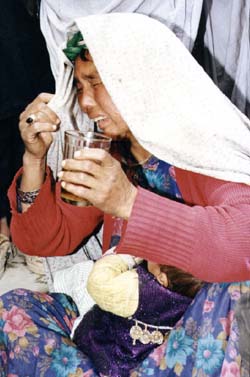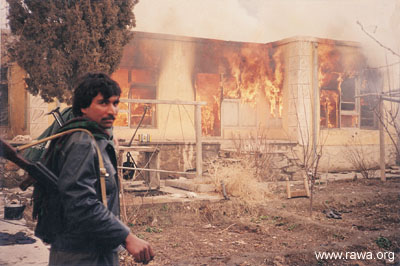Shahgul’s Story of Unbelievable Heartache
Report filed by RAWA based on an interview with the subject, July 2003
 My name is Shahgul and I am 50 years old. I am from Ghazni Province. My husband’s name was Muhammad Bakhsh and he served as an army officer. Many years ago we moved to Kabul and we lived in Afshar-e-Silo, an area in the South of Kabul. I had two daughters and two sons. My eldest son was Shafiq. He became an army officer just like his father. We had a middle class life, and we were happy with it.
My name is Shahgul and I am 50 years old. I am from Ghazni Province. My husband’s name was Muhammad Bakhsh and he served as an army officer. Many years ago we moved to Kabul and we lived in Afshar-e-Silo, an area in the South of Kabul. I had two daughters and two sons. My eldest son was Shafiq. He became an army officer just like his father. We had a middle class life, and we were happy with it.
Before 1992, ethnicity and different ethnic issues were never an issue for us. I never differentiated my neighbors or people around us based on ethnicity. We are Hazaras. Our neighbors to the right were Tajiks from Shamali, while on the left of our house, they were Pashtuns from Kundoz. We had quite a good relationship with each other and lived like a family. My daughters attended the same school as the neighbors’ girls and they were good friends.
In 1992, our area fell into the hands of Hezb-e-Wahdat (the party belonging to Hazaras). Not too far away, the Sayyaf group (who are Pashtuns) were controlling another area and the center of the city was in the hands of Massoud’s forces.
A never-ending struggle and warfare was prevailing all around the area and we were all worried. Frightening faces covered with long beards were roaming around in the streets. Spring had lost its bloom. My husband and my eldest son had lost their jobs. My son said that wild and ignorant people had gained control of everything and we were thrown out.
A fierce clash broke out between the Hezb-e-Wahdat and the United Front groups of Sayyaf and Massoud. It was raining bullets everywhere.
No one dared to leave their house. I was even unable to visit my neighbors for two days since we spent two days in the basement of our house to hide from the bullets.
In the morning of the third day, somebody was kicking the door. In the height of fear, we came out of our basement. We didn’t know who was banging on the door, and the whole street was full of people. The old and the young, men and women were running around with bare feet. We thought it was the end of time. They told us to run for our lives because the forces of Massoud were near our area and that they were going to slaughter all Hazaras. We frantically ran to the street not knowing where to go. All the people were leaving behind their belongings in their houses and were escaping for their lives. They didn’t even have the time to lock their doors. I could see the tanks coming towards us.
I witnessed a woman crying beside her wounded son and asking the Jehadies to help her take him to the hospital. The Jehadies didn’t pay any attention to her and kept on moving. I can still hear the cries of that woman. I paused for a few seconds and looked at her. My husband yelled at me, saying that we had to hurry, because they were firing RPGs (rocket propelled grenades). After three hours of constant walking we reached my uncle’s house in Dasht-e-Barchee.
After staying in my uncle’s home for two weeks, we heard on the radio that Rabbani and Mazari had reunited. We thought the situation might be better so we decided to go back to our house and collect some of our belongings. I didn’t let my son and my husband go back because on the way they would stop the men and give them a difficult time. I decided to go to Afshar with my elder daughter and my uncle’s wife.
Afshar was not the same anymore. It was difficult to recognize the streets. You could smell blood all around. A man wearing commando dress (the Massoud group used to wear them) asked us angrily: “Where the hell are you going you donkey Hazaras?” I begged and told him: “Son, I am going to take some of my belongings from my house.” I pleaded that it had been two weeks since we had been away from home and we had nothing. He said: “Why are you lying? You have come as spies for the Hazaras.” I cried: “Son, I am an old poor woman, and we don’t have anything to do with Hazaras or the any other ethnic group.” He said: “You can go to your house, but don’t look around.”
 Near the house, on the street, I noticed our family photo and picked it up. Our house had been looted. I noticed from a distance that Massoud’s forces were busy taking our car out of the house. I walked towards them and I wanted to scream, but I didn’t have the courage to go near them with my young daughter. I was afraid that they might do something to me and to my daughter. We went a bit closer, they asked again who I was and what I wanted. Out of fear I couldn’t tell them that the house belonged to me. Instead I said: “I’m going to the other street just to see my house.” In this moment I was trying to take a peak inside our house and noticed that three men were breaking the windows.
Near the house, on the street, I noticed our family photo and picked it up. Our house had been looted. I noticed from a distance that Massoud’s forces were busy taking our car out of the house. I walked towards them and I wanted to scream, but I didn’t have the courage to go near them with my young daughter. I was afraid that they might do something to me and to my daughter. We went a bit closer, they asked again who I was and what I wanted. Out of fear I couldn’t tell them that the house belonged to me. Instead I said: “I’m going to the other street just to see my house.” In this moment I was trying to take a peak inside our house and noticed that three men were breaking the windows.
I couldn’t stand there and witness these barbaric men destroying my house. They were breaking apart the house that I lived in for many years and shared wonderful memories with my husband and children. We went away as soon as we could. I could hear gun fire and it was escalating every moment. They said that the Hezb-e-Wahdat had begun another attack. I began to realize that we shouldn’t have came here at all. We had to run for our lives again. My daughter and my uncle’s wife were wearing the burqa and I was wearing a chadar, so my face was not covered. My daughter said: “cover your face mother so that they don’t know we are Hazaras.” Her words shattered my heart. I had to cover my face to hide my identity and save my life.
On the way we had to pass by many dead bodies. I saw a wounded boy trying to get up and waving his hand for help, and everyone was passing by him quickly. Nobody was listening to anyone. I felt like I was in hell. My feet were injured. There was heavy firing going on and we had to take shelter in the Jehadies hiding place. They made us fill their magazines with bullets. We left the front in the evening and got home at midnight. I was speechless when I arrived home and had nightmares the whole night.
Every time I remembered my house I would shed tears. I can’t forget the faces of those men who were taking our car and breaking our windows. Every time I remember that scene I feel like they are shattering my heart.
We started a new life. My sons were selling things in the streets. My husband found a job as a cook. Every night and day was a torture for us. We were witnessing thousands of people grieving and fighting. Every night before going to sleep we would pray to wake up alive the next day.
The Taliban were coming forward while the Jehadies were escaping. We were waiting for even worse days. We didn’t consider Pashtuns our neighbors anymore. They were our enemies.
The Taliban took over the country. After a few days of Taliban control over Dasht-e-Barchee they started coming to our house asking my husband to give out his weapons. We told them we didn’t have any weapons, nor had we ever taken part in any fighting. One day my eldest son and I went to the market. When we returned, there were people gathered all around our house. As I got closer I saw three Talibs by my house. I sneaked inside the front yard without them noticing. My eldest daughter ran crying to me with her head bleeding. When I entered the house, I found my younger son in a corner. He was unconscious along with his little sister. I ran out quickly. The three Talibs were dragging my eldest son with them. I reached them, but one Talib hit me with the back of his gun and I fainted not knowing what happened.
When I opened my eyes, I noticed that people were attending my husband’s funeral. The Taliban had attacked our house with RPGs. My husband was killed; my two daughters and younger son were taken to the hospital.
A woman with her child recounts how her husband was killed in Afshar, west Kabul by forces of Ahmad Shah Masoud in 1993.No one was listening to my cries. I didn’t know who to cry for first. For my elder son whom Taliban kidnapped and I didn’t know where he was; for my husband who had just returned from work and slept forever; for my injured daughter, or for my youngest son who’s legs were amputated in the hospital.
I began to search for my eldest son in the Taliban posts. I was insulted. Everyone was kicking me saying: “Why are you here you Hazara?” I was not successful in finding my son. At last I decided escape to Pakistan because we had no jobs and practically no food to eat.
I live in Khyaban-e-Sir Sayed now. My son, who is lame, works in the tailor’s shop and gets a small salary. I don’t have any other source of income. There are no jobs here for refugees. I have cried so much that now I have pain in my eyes. Some Afghans who live near our house here told me that an Afghan organization had established a hospital for Afghans. So I have come to this hospital for a cure. For the first time after many years I found someone to share my pains with. I found someone who is willing to listen to my miserable life story. I can’t do anything other than pray for those who have made this hospital to help poor Afghans like me.
My heart aches for all the Afghan refugees here in Pakistan, especially for my daughters who have no one but me. If it wasn’t for my daughters, there would be nothing for me to live for.


